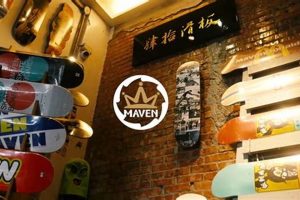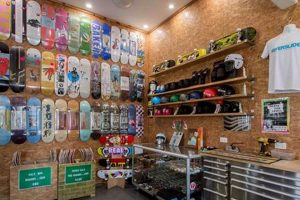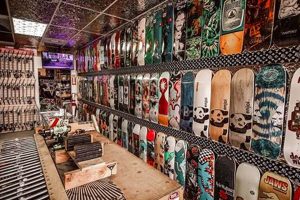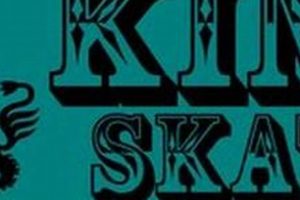Establishments specializing in the sale of skateboarding equipment, apparel, and related accessories located within the Dallas metropolitan area are essential resources for skateboarders of all skill levels. These retailers provide a range of products, from complete skateboards and decks to trucks, wheels, bearings, and protective gear. Examples include independently owned stores and larger chain retailers that cater to the skateboarding community.
The presence of these businesses contributes to the local skateboarding scene by providing access to necessary equipment and fostering a sense of community. They often serve as gathering places for skateboarders, offering advice, hosting events, and supporting local skateboarding initiatives. Their historical context can be traced back to the emergence of skateboarding as a popular activity, with retail locations evolving alongside the sport’s development and cultural influence.
The following sections will delve into specific retail locations within the city, discussing their product offerings, services, and contributions to the local skateboarding environment. This includes an overview of different types of available equipment, repair services, and community engagement activities.
Skateboarding Equipment Acquisition Guidance
This section provides guidance pertaining to the selection and maintenance of skateboarding equipment based on retail expertise available in the Dallas area. Adhering to these guidelines can improve safety, performance, and the longevity of equipment.
Tip 1: Deck Selection: Consider deck width and length based on foot size and riding style. Wider decks offer stability, while narrower decks facilitate quicker maneuvers. Example: A street skater may prefer an 8-inch deck, whereas a vert skater might choose an 8.5-inch or wider deck.
Tip 2: Truck Compatibility: Ensure truck width is appropriately matched to the deck width. Trucks that are too wide or too narrow can compromise stability and turning ability. Measure the deck’s width and consult with sales staff to identify compatible truck sizes.
Tip 3: Wheel Durometer: Select wheel durometer based on the intended riding surface. Softer wheels (lower durometer) provide better grip on rough surfaces, while harder wheels (higher durometer) are faster on smooth surfaces. Example: 78A wheels are suitable for cruising, while 99A or higher wheels are preferable for skate parks.
Tip 4: Bearing Maintenance: Regularly clean and lubricate bearings to maintain optimal speed and performance. Dirt and debris can cause friction and reduce bearing efficiency. Use a bearing cleaner and lubricant designed specifically for skateboard bearings.
Tip 5: Protective Gear: Prioritize the use of appropriate protective gear, including helmets, knee pads, elbow pads, and wrist guards. Wearing protective gear can significantly reduce the risk of injury. Ensure all gear fits properly and is securely fastened.
Tip 6: Hardware Inspection: Routinely inspect all hardware (nuts, bolts, screws) for wear and tear. Loose or damaged hardware can compromise the integrity of the skateboard and increase the risk of accidents. Replace worn hardware promptly.
Tip 7: Shop Expertise: Leverage the expertise of sales staff at established retail locations. They can provide valuable advice on equipment selection, maintenance, and troubleshooting. Don’t hesitate to ask questions and seek guidance.
Tip 8: Surface Awareness: Be vigilant about the riding surface, checking for debris or damage that could cause instability or falls. Pay attention to cracks, rocks, and other hazards. A smooth and unobstructed surface is critical for safer skating.
Adherence to these guidelines promotes a safer and more enjoyable skateboarding experience. Proper equipment selection, maintenance, and utilization of retail expertise are crucial for both beginner and experienced skateboarders.
The subsequent section will provide an overview of specific retail establishments catering to skateboarding enthusiasts within the Dallas area.
1. Equipment availability
Equipment availability is a foundational component of the skateboarding ecosystem in Dallas, directly influencing participation rates and skill progression. Skate shops in Dallas serve as the primary distribution channels for skateboarding hardware and protective gear. The correlation between the accessibility of quality skateboarding equipment and the vibrancy of the local skateboarding scene is demonstrable. When local skaters have ready access to diverse products, ranging from decks and trucks to wheels and bearings, participation in the sport grows. For example, shops that stock various deck sizes and concave profiles allow skaters to customize their setups to suit their individual preferences and riding styles, thus enhancing performance and enjoyment.
The absence of adequate equipment availability can stifle the growth of the sport and limit the potential of local skaters. If shops fail to stock a sufficient range of products, or if prices are prohibitive, individuals may be deterred from participating or may be forced to use substandard equipment, which can increase the risk of injury. Furthermore, shops that offer specialized equipment, such as longboard setups for cruising or transition skating, cater to a broader range of interests and skill levels within the skateboarding community. These services make these retail location in dallas vital.
The practical significance of understanding this relationship lies in the need for continued support and development of local skate shops. By ensuring that these businesses are well-stocked and accessible, the city can foster a thriving skateboarding culture that benefits both participants and the broader community. Challenges may include supply chain disruptions, economic fluctuations, and competition from online retailers. However, the tangible benefits of a robust local skateboarding scene, including increased physical activity, community engagement, and economic opportunities, warrant sustained investment in the retail infrastructure that supports it. This ecosystem is interconnected and the lack of any one of them affects other parts of the ecosystem, making it important to maintain these skate shops in dallas and their quality.
2. Skateboarding Community
The skateboarding community and retail locations specializing in skateboarding equipment maintain a symbiotic relationship, each influencing the other’s growth and evolution. The community’s existence provides the foundation for these retailers’ economic viability. Local skate shops act as central hubs, providing not only necessary supplies but also spaces for interaction, information exchange, and the propagation of skateboarding culture. Consider the example of a shop hosting a “Go Skateboarding Day” event; this attracts skateboarders of all levels, fostering a sense of shared identity and providing opportunities for mentorship and skill development. The shop, in turn, benefits from increased visibility and sales, solidifying its position within the community.
A vibrant skateboarding community directly impacts the types of products and services offered by these businesses. Shops often tailor their inventories to reflect the specific needs and preferences of local skaters, stocking particular brands or specialized equipment requested by their clientele. Furthermore, shops frequently sponsor local skateboarders, providing them with equipment and support in exchange for representation and promotion. This sponsorship serves as a tangible investment in the community’s growth, encouraging aspiring skateboarders and fostering a sense of loyalty among existing customers. The retail locations also serve as a source of income for skateboarders in Dallas and the surrounding areas.
Understanding this dynamic is critical for both retailers and community organizers. For retailers, recognizing the importance of community engagement can lead to more effective marketing strategies and stronger customer relationships. For community organizers, collaborating with local shops can provide access to resources, venues, and expertise, enhancing the reach and impact of their initiatives. The skateboarding community and the stores that support it rely on each other for long term success, and is a critical aspect of the local culture.
3. Retail Locations
The presence and characteristics of retail locations are defining elements of the skateboarding landscape within the Dallas area. These establishments serve as physical hubs where skateboarders acquire equipment, connect with the community, and access resources that support their participation in the sport.
- Shop Proximity to Skate Spots
The geographic location of a shop relative to popular skate spots impacts its accessibility and relevance to the local skateboarding community. Retail locations situated near skate parks or frequently used street spots tend to attract a higher volume of customers and become integrated into the daily routines of skateboarders. For example, a shop located within walking distance of a well-known skate park benefits from spontaneous visits and impulse purchases. Conversely, shops located in more isolated areas may struggle to attract consistent foot traffic.
- Shop Atmosphere and Design
The physical environment of a shop contributes significantly to its appeal. Establishments that cultivate a welcoming and inclusive atmosphere, often characterized by skateboarding-themed decor, comfortable seating areas, and knowledgeable staff, tend to foster a stronger sense of community. A well-designed shop can serve as a gathering place where skateboarders can socialize, share information, and find inspiration. In contrast, a shop with a sterile or unwelcoming environment may deter customers and limit its potential to function as a community hub.
- Specialization and Product Selection
Retail locations may differentiate themselves based on their product offerings. Some shops specialize in specific types of skateboarding, such as street skating, vert skating, or longboarding, while others offer a broader range of products to cater to a wider audience. Shops that carry high-quality brands, rare or hard-to-find items, or customized equipment options tend to attract more discerning customers. Conversely, shops that focus solely on entry-level products may appeal to beginners but may not satisfy the needs of more experienced skateboarders.
- Integration of Repair and Service Facilities
Retail locations that offer repair and maintenance services can enhance their value proposition and customer loyalty. Shops equipped to perform services such as deck mounting, grip tape application, bearing cleaning, and truck adjustments provide added convenience and expertise. The availability of repair services can be particularly appealing to skateboarders who lack the tools or knowledge to perform these tasks themselves. Furthermore, shops that offer lessons or workshops can further solidify their role as educational resources within the skateboarding community.
The aforementioned facets collectively influence the overall impact of retail locations on the skateboarding community in Dallas. Shops that prioritize accessibility, atmosphere, product selection, and service integration are more likely to thrive and contribute positively to the growth and development of skateboarding in the area.
4. Repair Services
The availability of repair services at establishments selling skateboarding equipment within the Dallas area constitutes a critical aspect of supporting the skateboarding community. These services extend the lifespan of equipment, reduce costs for skateboarders, and foster a sense of community around these retail locations.
- Deck Repair and Replacement
Skateboard decks are subject to significant wear and tear, resulting in cracks, chips, and delamination. Shops offering repair services can perform minor repairs to prolong the life of a deck or provide deck replacement services, including mounting hardware and grip tape application. This reduces the financial burden on skateboarders, particularly younger or less affluent individuals, and promotes sustainability by minimizing waste.
- Truck and Wheel Maintenance
Trucks and wheels also require periodic maintenance and replacement. Shops offering repair services can replace worn bushings, pivot cups, and axles on trucks. They can also replace bearings in wheels, clean wheels, and provide advice on optimal wheel selection for different riding styles and surfaces. These services enhance the performance and safety of skateboards.
- Hardware Replacement and Adjustment
Nuts, bolts, and screws on skateboards can loosen or become damaged over time, compromising the stability and safety of the equipment. Shops offering repair services can replace worn hardware and adjust trucks and wheels to ensure proper alignment and functionality. This attention to detail helps prevent accidents and injuries.
- Customization and Modification
Some shops offer customization and modification services, allowing skateboarders to personalize their equipment to suit their individual preferences. This can include custom grip tape designs, truck modifications, and wheel configurations. These services enhance the aesthetic appeal and functionality of skateboards, fostering a sense of ownership and pride among skateboarders.
The availability of competent repair services through Dallas skate shops bolsters both the users ability to continue using their board as well as the shops ability to connect with the local skateboarding scene. By providing these services, retailers solidify their role as essential resources for skateboarders of all skill levels and contribute to the overall health and sustainability of the local skateboarding community.
5. Product Variety
Product variety significantly influences the appeal and utility of establishments offering skateboarding equipment within the Dallas area. The breadth and depth of available products dictate the capacity of these retailers to cater to diverse customer needs and preferences, and directly impacts their standing within the local skateboarding community.
- Range of Deck Brands and Sizes
The selection of skateboard decks, encompassing variations in brand, width, length, concave, and construction material, directly impacts a shop’s ability to accommodate skateboarders of differing skill levels and riding styles. A retailer offering a limited range of deck options may fail to meet the needs of specialized skaters or those seeking specific performance characteristics. The availability of both established brands and emerging brands is important for attracting a wide range of skaters. Example: A shop stocking both Powell Peralta and local Dallas board brands would cater to varied tastes.
- Truck and Wheel Combinations
The variety of trucks and wheels available, considering factors such as axle width, height, durometer, and bearing compatibility, is crucial for optimizing skateboard performance. Retail locations that offer a comprehensive selection of these components allow customers to fine-tune their setups for specific terrains and riding styles. The absence of appropriate truck and wheel options can limit a skateboarder’s ability to achieve optimal control and speed. Example: A wider wheel base truck for downhill, and a smaller wheel base for street.
- Protective Gear Options
The availability of a range of protective gear, including helmets, knee pads, elbow pads, and wrist guards, is essential for promoting safety and encouraging participation in skateboarding. Retail locations that offer a diverse selection of protective gear in various sizes and styles cater to the needs of skateboarders of all ages and skill levels. The absence of adequate protective gear options can discourage participation and increase the risk of injury. Examples may include different style helmets such as full-face or half-shell, and sizes ranging from youth to adult XL.
- Apparel and Accessories
The selection of apparel and accessories, including skateboarding shoes, clothing, and related items, contributes to the overall shopping experience and helps to foster a sense of community. Retail locations that offer a wide range of these products attract customers who seek both functional skateboarding gear and stylish attire. The absence of appealing apparel and accessories can diminish the attractiveness of a shop. Example: Local skate shops that sell shoes designed for skateboarding can improve their relevance.
In conclusion, the diversity of products available at establishments within the Dallas area specializing in skateboarding equipment is directly related to their ability to cater to a broad spectrum of customers, foster community engagement, and promote the growth of skateboarding in the region. Retail locations that prioritize product variety are more likely to thrive and serve as valuable resources for skateboarders of all levels. These shops offer options in clothing, wheels, trucks, boards, safety equipment, as well as other niche items.
6. Local events
Local events serve as pivotal catalysts in fortifying the symbiotic relationship between skateboarding establishments and the broader Dallas skateboarding community. These events provide platforms for engagement, skill enhancement, and cultural exchange, significantly contributing to the vitality of the skateboarding ecosystem.
- Shop-Sponsored Competitions
Retail locations frequently sponsor or host skateboarding competitions, offering opportunities for local skaters to showcase their abilities and compete for prizes. These events draw participants and spectators alike, generating revenue for the sponsoring shop and enhancing its visibility within the community. Such competitions serve as a breeding ground for talent, fostering a competitive spirit and encouraging skill progression. Example: Best Trick contests sponsored by shops at local skateparks.
- Community Skate Jams
Informal skate jams, often organized by local shops, provide a relaxed and inclusive environment for skateboarders of all skill levels to congregate and enjoy their shared passion. These events promote camaraderie, facilitate mentorship, and encourage participation in skateboarding. Skate jams may feature music, food, and product giveaways, further enhancing their appeal and drawing power. Example: A shop-hosted event providing free skate lessons for beginners.
- Product Demonstrations and Workshops
Establishments offering skateboarding equipment frequently host product demonstrations and workshops, providing opportunities for customers to learn about new products and techniques. These events educate consumers about the latest advancements in skateboarding technology and offer hands-on training in areas such as deck setup, wheel maintenance, and trick execution. Product demonstrations and workshops enhance customer knowledge, build brand loyalty, and drive sales. Example: Truck tuning workshops, bearing maintenance tutorials.
- “Go Skateboarding Day” Celebrations
“Go Skateboarding Day,” an annual event celebrated on June 21st, provides a focal point for skateboarding activity worldwide. Local skate shops often organize special events to commemorate the occasion, including skate contests, street sessions, and community gatherings. These celebrations raise awareness of skateboarding culture, promote participation in the sport, and foster a sense of unity within the skateboarding community. Example: Shop-organized street skate through downtown Dallas culminating in a gathering at a designated skate spot.
Local events, orchestrated by and benefiting from the support of skate shops, are essential for nurturing a vibrant and engaged skateboarding community within Dallas. These events provide opportunities for skill development, community building, and cultural expression, solidifying the role of skateboarding establishments as integral components of the local skateboarding landscape.
Frequently Asked Questions
The following section addresses common inquiries regarding establishments specializing in skateboarding equipment within the Dallas metropolitan area. These questions aim to provide clarity and informative guidance for individuals seeking skateboarding-related products and services.
Question 1: What types of skateboards are typically available at Dallas skate shops?
Dallas skate shops generally stock a variety of skateboard types, including standard skateboards for street and park skating, longboards for cruising and downhill, and cruisers for transportation. The specific inventory can vary depending on the shop’s specialization and target customer base.
Question 2: Do Dallas skate shops offer skateboard repair services?
Many skate shops in Dallas provide repair services such as deck replacement, truck mounting, bearing replacement, and hardware adjustments. Availability of specific services can vary, therefore direct inquiry with the shop is advisable.
Question 3: How do I determine the appropriate skateboard size for my needs?
Skateboard size selection depends on factors such as foot size, height, and intended riding style. Width is the primary consideration; narrower decks (7.5-8.0 inches) are often preferred for technical street skating, while wider decks (8.25 inches and up) provide greater stability for transition and park skating. Consultation with shop personnel is recommended.
Question 4: Are skate shops in Dallas typically staffed by knowledgeable skateboarders?
Reputable skate shops generally employ individuals with skateboarding experience who can offer informed advice on product selection and maintenance. However, the level of expertise may vary. Assessing employee knowledge through direct interaction is recommended.
Question 5: Do skate shops in Dallas offer protective gear for skateboarding?
Most skate shops stock a range of protective gear, including helmets, knee pads, elbow pads, and wrist guards. Prioritizing the use of appropriate protective gear is essential for safe skateboarding. Ensuring proper fit is crucial for optimal protection.
Question 6: How can I find out about skateboarding events and activities in Dallas?
Local skate shops often serve as information hubs for skateboarding events and activities in the Dallas area. Checking shop websites, social media pages, and bulletin boards is recommended. Direct communication with shop staff can also provide valuable insights.
These FAQs provide essential information to assist individuals in navigating the skateboarding retail landscape within Dallas. Utilizing the knowledge gained through these questions promotes informed decision-making and enhances the skateboarding experience.
The subsequent section will provide a summary of the key points discussed and offer concluding remarks.
Conclusion
The preceding analysis has examined various facets of skate shops in Dallas, underscoring their significance within the local skateboarding ecosystem. The availability of equipment, the fostering of community, the provision of repair services, the maintenance of product variety, and the hosting of local events each contribute to the overall health and vibrancy of skateboarding in the city. These establishments are not merely retail outlets; they function as community hubs, promoting participation, facilitating skill development, and nurturing a shared passion for skateboarding.
The sustained success of skate shops in Dallas is contingent upon their ability to adapt to evolving market conditions and cater to the diverse needs of the skateboarding community. Recognizing their integral role in supporting the sport, ongoing support from both skateboarders and the broader community is essential to ensure the continued growth and prosperity of skateboarding in Dallas.







